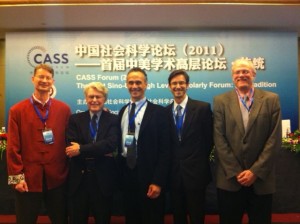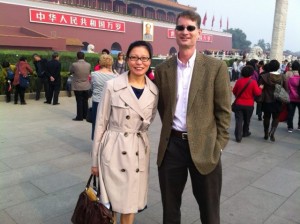Wesleyan and China: the Beijing Conference

In China, rapid economic growth and social transformation have stimulated interest there in how societies have dealt with dramatic change. Some of China’s foremost scholars reached out to colleagues at Wesleyan, seeking to discuss the meaning of “tradition” in historical and philosophical perspectives.
“Wesleyan publishes History and Theory, the leading journal on the philosophy and theory of history in the Western world,” says Brian Fay, professor of philosophy, and the journal’s executive editor. “This subject area is intellectually and politically very important in China, and hence the journal was well known to them.”
It was in part because of History and Theory that a delegation from the Social Sciences in China Press, the publishing arm of the Chinese Academy of the Social Sciences, visited Wesleyan in 2010. Fay, his co-editors of History and Theory, and President Roth spent much of a day with the delegation discussing opportunities for scholarly interaction. The result was a commitment to two conferences, one in China and a second in 2013 at Wesleyan.
Five weeks ago the first conference was convened in Beijing, with five Wesleyan scholars traveling to the city to discuss the concept of tradition: Stephen Angle, professor of philosophy, professor of East Asian Studies; Ethan Kleinberg, professor of history, professor of letters; Philip Pomper, William Armstrong Professor of History, Emeritus; Wesleyan President Michael Roth, university professor, who specializes in intellectual history; and Joseph Rouse, Hedding Professor of Moral Science, chair and professor, science in society, professor of philosophy. Five other western scholars also traveled to the conference to make presentations.
The event’s host, Professor Gao Xiang, worked with Fay, Angle, and others to ensure there would be ample opportunity for substantive discussion of the papers, which had been submitted and reviewed months in advance.
The topics were diverse. Angle, who specializes in Chinese moral and political philosophy, presented a paper titled “American Confucianism: Between Tradition and Universal Value.”
“Part of my intention was to undermine the equation between Chinese culture and Confucianism that is often heard, though rarely convincingly defended, in China today,” Angle says.
Kleinberg discussed whether the past we reconstruct in the present ever really existed, making reference to the work of Martin Heidegger, Emmanuel Levinas and Jacques Derrida.
“I thought the event went very well especially in the moments of conversation and informal intellectual exchange,” Kleinberg says. “All the scholars involved had so much to offer each other and much to learn from one another. I was especially gratified by a graduate student who directed exacting questions at both myself and a Chinese scholar who was on the same panel. Her questions were so intelligent and precise, and she was so eager to get as much as she could from this exchange, that I could feel the energy in the room.”
Rouse’s presentation was titled, “Tradition in the Natural Sciences and ‘Human Nature’.”
“I challenged the ways in which many discussions of “tradition” implicitly separate nature from culture, and instead sought to bring discussions of scientific practice and scientific conceptions of nature back into critical reflection on tradition, history and politics,” Rouse says.
Pomper spoke on “The Evolution of the Russian Tradition of State Power.” He tracked the Russian tradition of state power from its beginning in the late fifteenth century under the Muscovite Tsars and down to the present under Putin.
“I discussed the major features of the Russian power system and critiqued two contrasting theories about its persistence,” he says. “Continuing the emphasis upon theory, I presented my own evolutionary approach to the problem.”
President Roth offered a paper focused on “the “anti-traditional tradition” of American thinking on liberal education,” with emphasis on Thomas Jefferson and Ralph Waldo Emerson. He also presented opening and closing remarks to all the conference attendees.
“The focus of my remarks concerned the fact that we often start talking about tradition when tradition is under real strain,” Roth says. “We see those strains currently in the US and in China. I focused on views that linked education and freedom, and on the Emersonian notion of self-reliance. I was surprised and delighted when Professor Gao quoted Emerson in his concluding remarks at the conference.”

Roth added that he thought the conference was highly successful as well as intellectually challenging.
“There was for me the interesting phenomenon of the Party officials looking to tradition, and to education, as a way of preserving non-instrumental values. Here in the United States many want education to become ever more instrumental – so as to compete with the Chinese!”
Kleinberg, who is set to become the executive editor of History and Theory on Jan. 1, 2012, was similarly impressed.
“The exchange was fascinating in many ways but especially in terms of how we were able to see how important ‘philosophy of history’ is for the Chinese in both the political and cultural context,” he says. “In the United States we tend to think of philosophy of history as a purely academic exercise, but in China it holds greater political and cultural weight. I think it a sign of the global recognition of Wesleyan and History and Theory that the Chinese Academy of Social Sciences chose us as their partner for this endeavor.”
The second conference, which will be hosted by Wesleyan in 2013, will focus on the theme of “Unfinished Enlightenment” in both Chinese and Western contexts.
President Roth also blogged about the conference.

